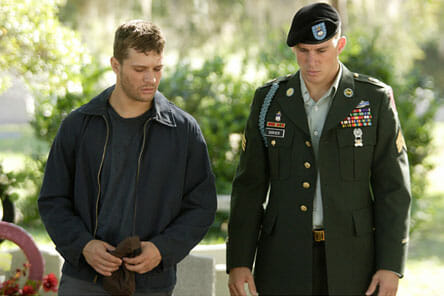
Release Date: March 28
Director: Kimberly Peirce
Writers: Mark Richard & Kimberly Peirce
Cinematographer: Chris Menges
Starring: Ryan Phillippe, Abbie Cornish, Channing Tatum, Joseph Gordon-Levitt
Studio/Run Time: Paramount/MTV Films, 113 mins.
Narrative feature films about the Iraq war that arrive in 2008 should be able to benefit from five years of reflection and from the access they have to their characters’ thoughts, something even a good documentary film doesn’t necessarily have. But the recent fiction films have fallen short, which leaves a gaping hole in our national dialogue. Sometimes we process our world by telling stories, and truthful fictions don’t need to be philosophical, offer solutions, or expose injustices. They just need to expose the humanity of a situation, and if there’s ever been a time for art to enter the hearts and brains of soldiers and politicians, that time ought to be now.
The latest attempt, a film called Stop-Loss by Kimberley Peirce (Boys Don’t Cry), is an earnest, important, and often moving story, but its priorities seem to be somewhere outside of its characters.
The term “stop-loss” refers to the policy of extending a soldier’s tour of duty just when he or she is headed home, and the film begins when an Army unit is wrapping up a harrowing tour in Tikrit before returning to a hero’s welcome in Texas. As you might expect, the boys come home with plenty of mental baggage, and they soon develop severe problems with violent behavior and drinking. These real concerns seem melodramatic when they’re packed into the space of 48 hours, especially compared to a documentary like The War Tapes where some of the same problems appear gradually. A single, well-placed shot in that film—of a little boy clinging to his dad—says more about military families than all the histrionics that fill the first third of Stop-Loss.
The second and more serious misstep happens when one of the characters—Sgt. King, played by Ryan Philippe—is told he’s being redeployed to Iraq. Incredulous and angry, he goes AWOL to track down a senator in DC who once shook his hand and called him a hero. His journey is both the central plot of the film and its weakest concept, as we’re asked to believe that this decorated veteran would so easily jump ship, would naively think a senator could help, would take a car from Texas to DC instead of placing a phone call, and would need a girl to drive him there. She’s a sounding board and a pretty face, but little else.
Stop-Loss is saved somewhat simply by being entertaining. Fistfights, close calls and stops along the way keep the road trip interesting. But ultimately, Peirce and writing partner Mark Richard seem too ready to honor movie conventions at the expense of the issues. They’ve come up with a conclusion that seems designed to please all camps and to keep the film from being pigeonholed as either a flag-waver or a peacenik. It’s a politician’s ending, touching and gutless. It strokes every personal ideal, whatever it is, rather than aligning itself with its characters and letting the conclusions arise out of who they are. To the filmmakers’ credit, they don’t pretend that all the problems are solved, but they give them a glossy coat that stands in contrast to the grit that covers the opening scenes in Tikrit, even though that’s exactly where the stop-lossed guys are headed.